Emergency Psychiatric Crisis Nurse Resume Examples

Jul 18, 2024
|
12 min read
Master the art of showcasing your crisis intervention skills: Your step-by-step nursing resume guide for emergency psychiatric settings.
Rated by 348 people
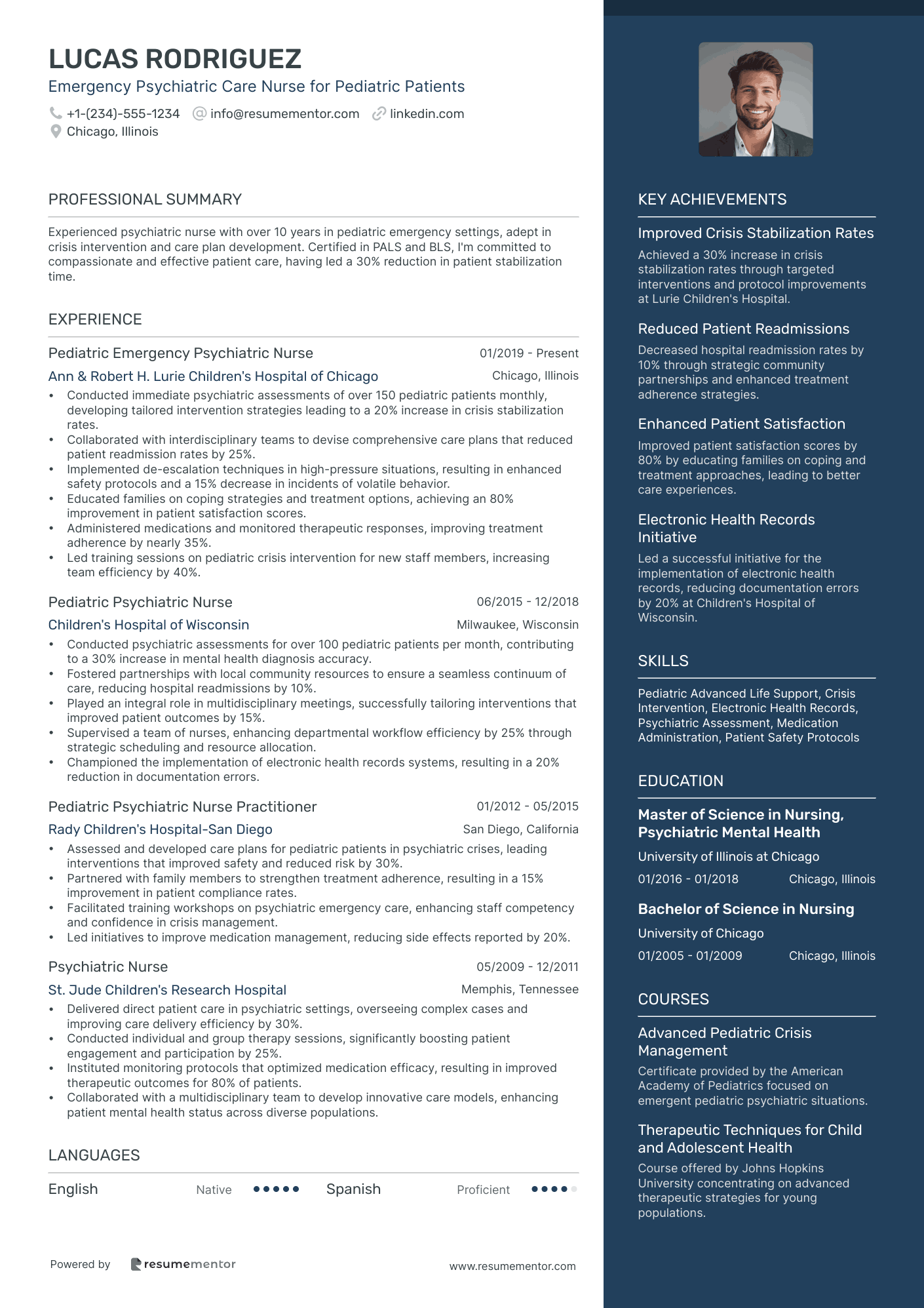
Emergency Psychiatric Care Nurse for Pediatric Patients
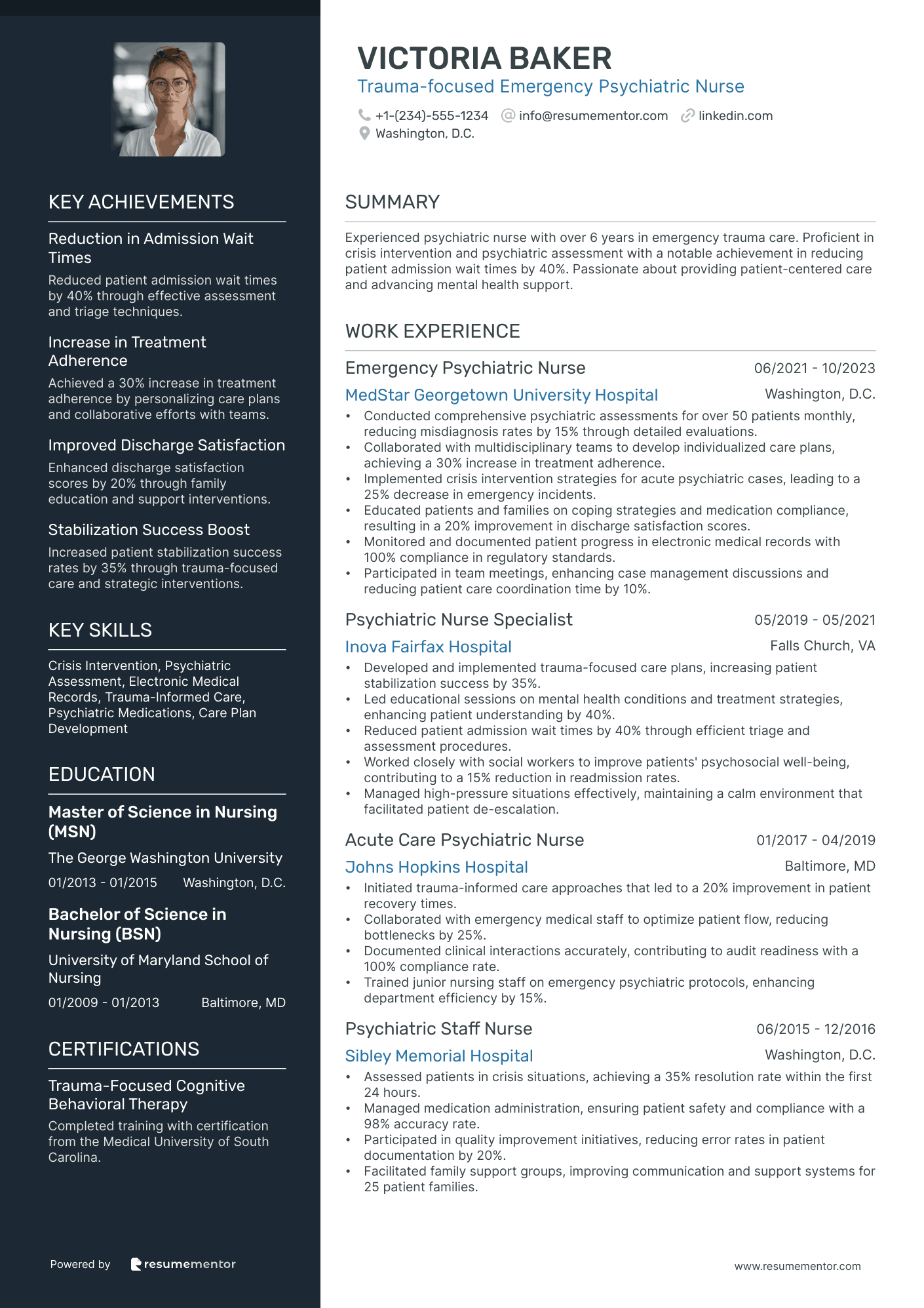
Trauma-focused Emergency Psychiatric Nurse
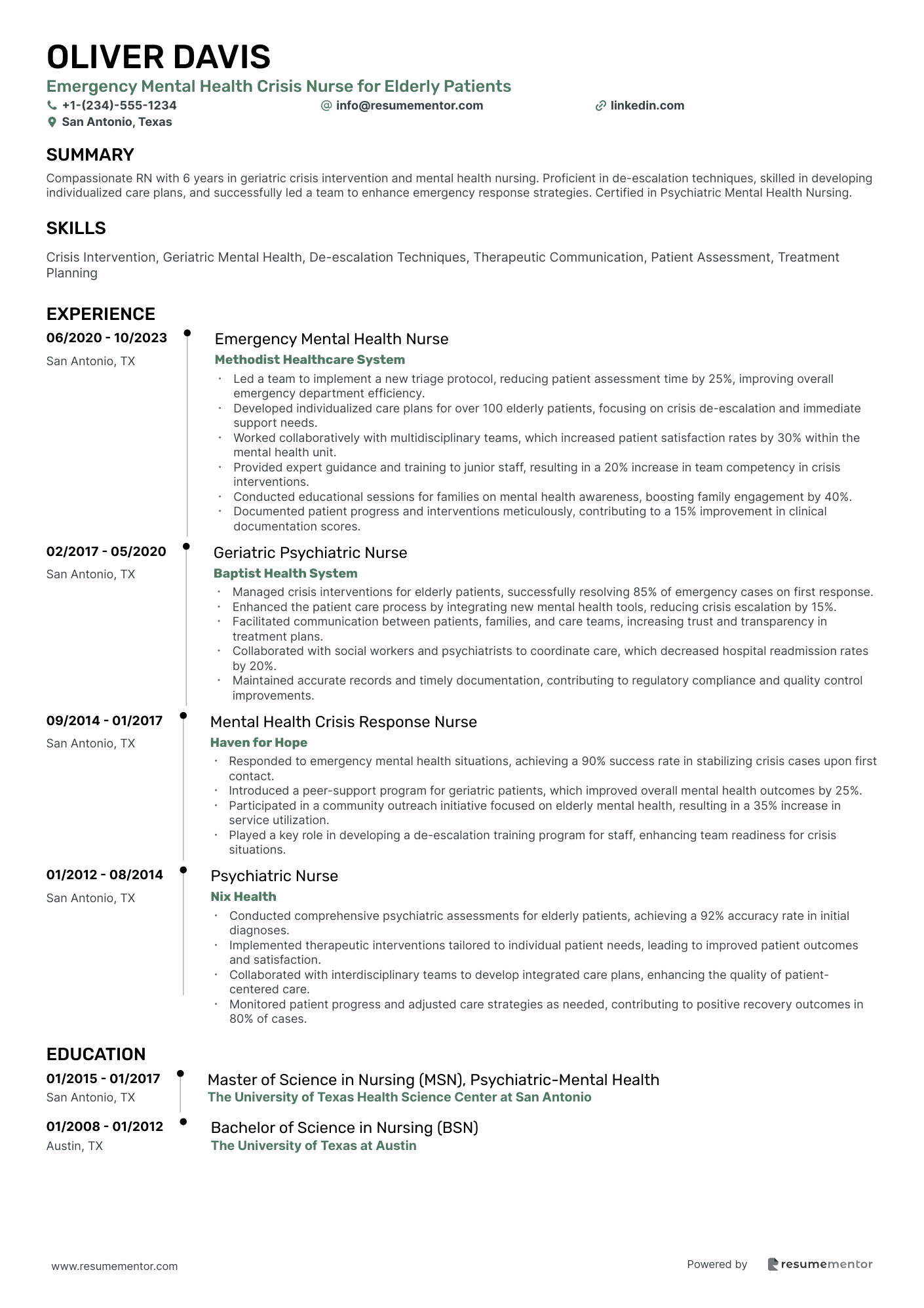
Emergency Mental Health Crisis Nurse for Elderly Patients
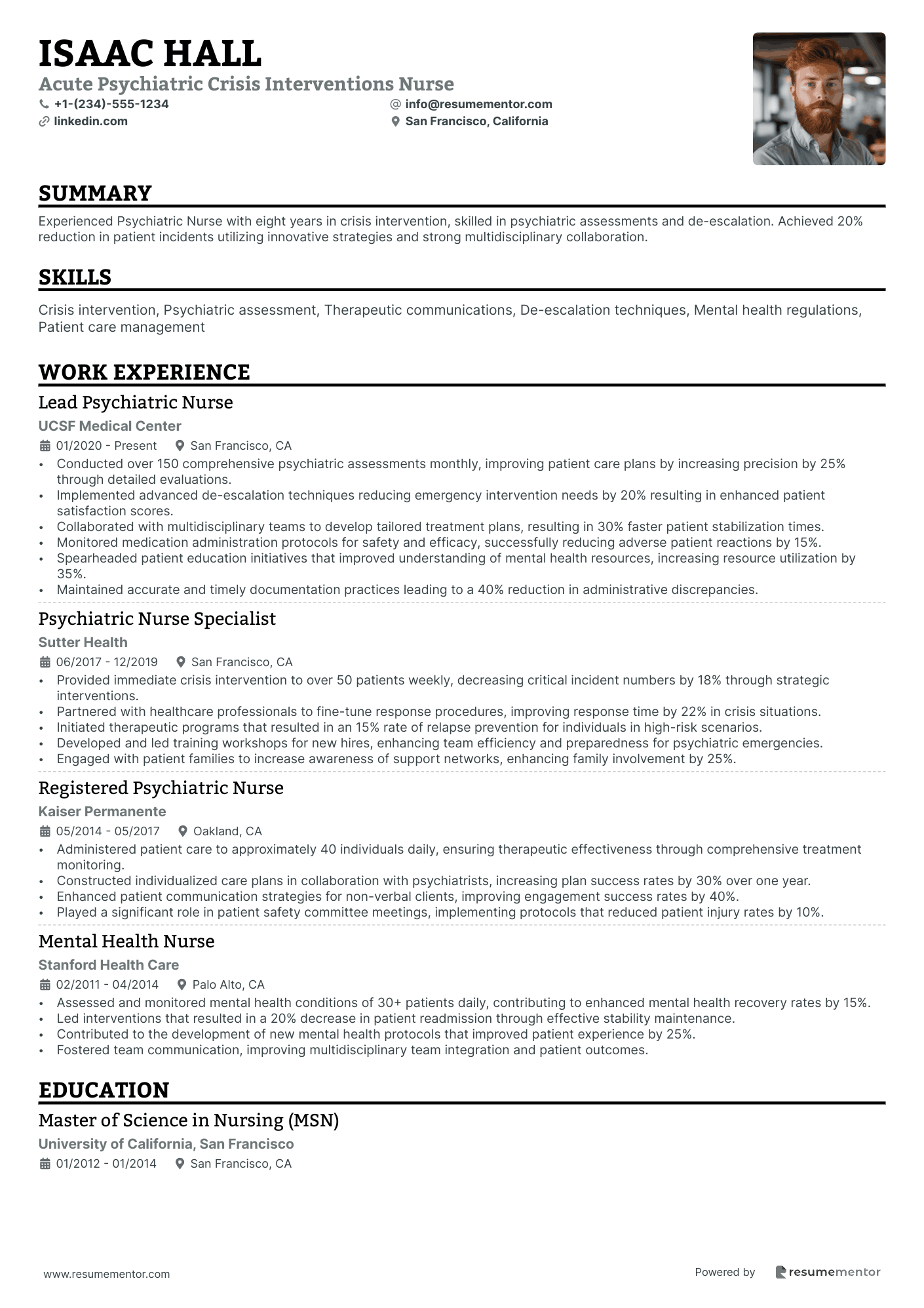
Acute Psychiatric Crisis Interventions Nurse
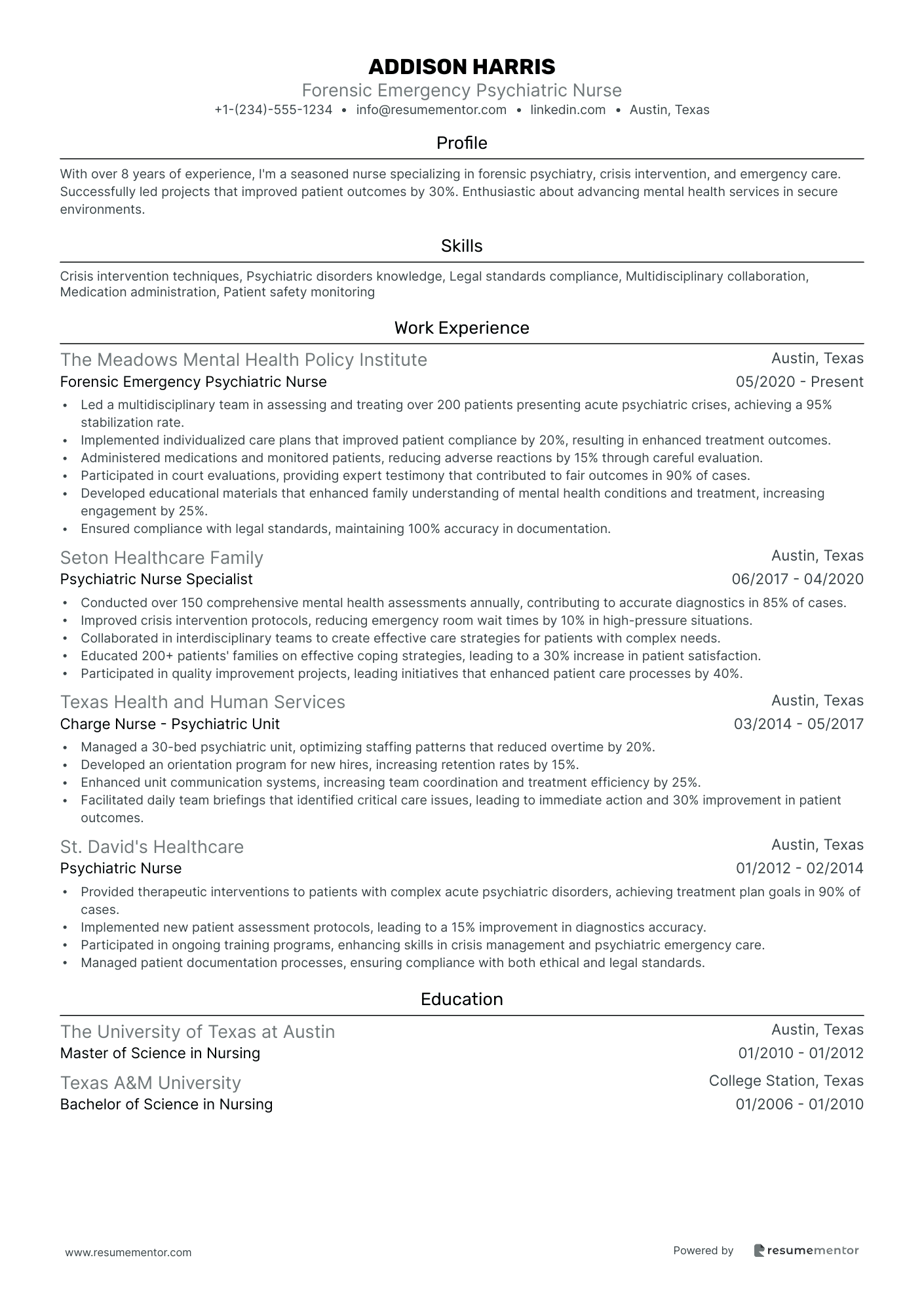
Forensic Emergency Psychiatric Nurse
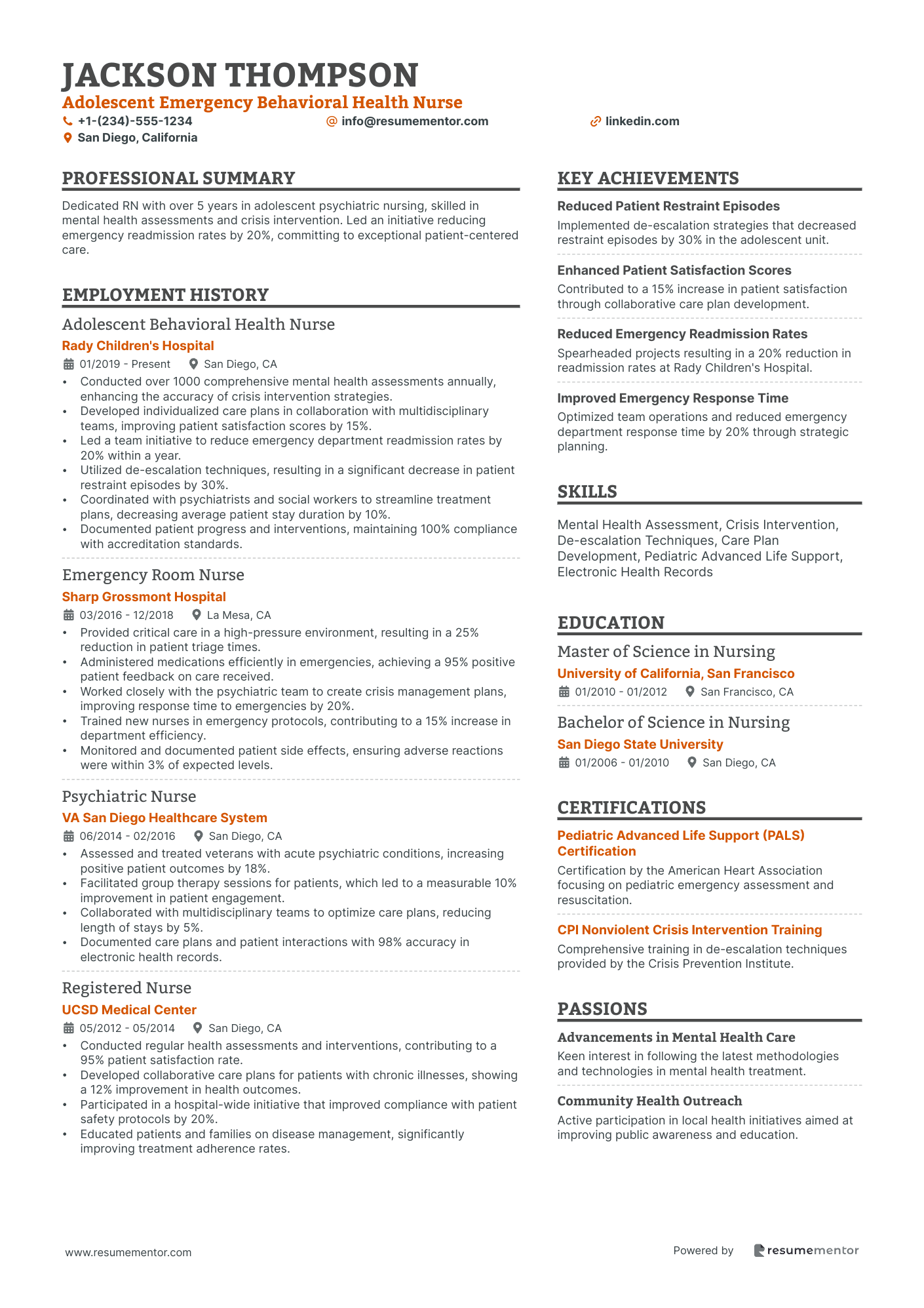
Adolescent Emergency Behavioral Health Nurse
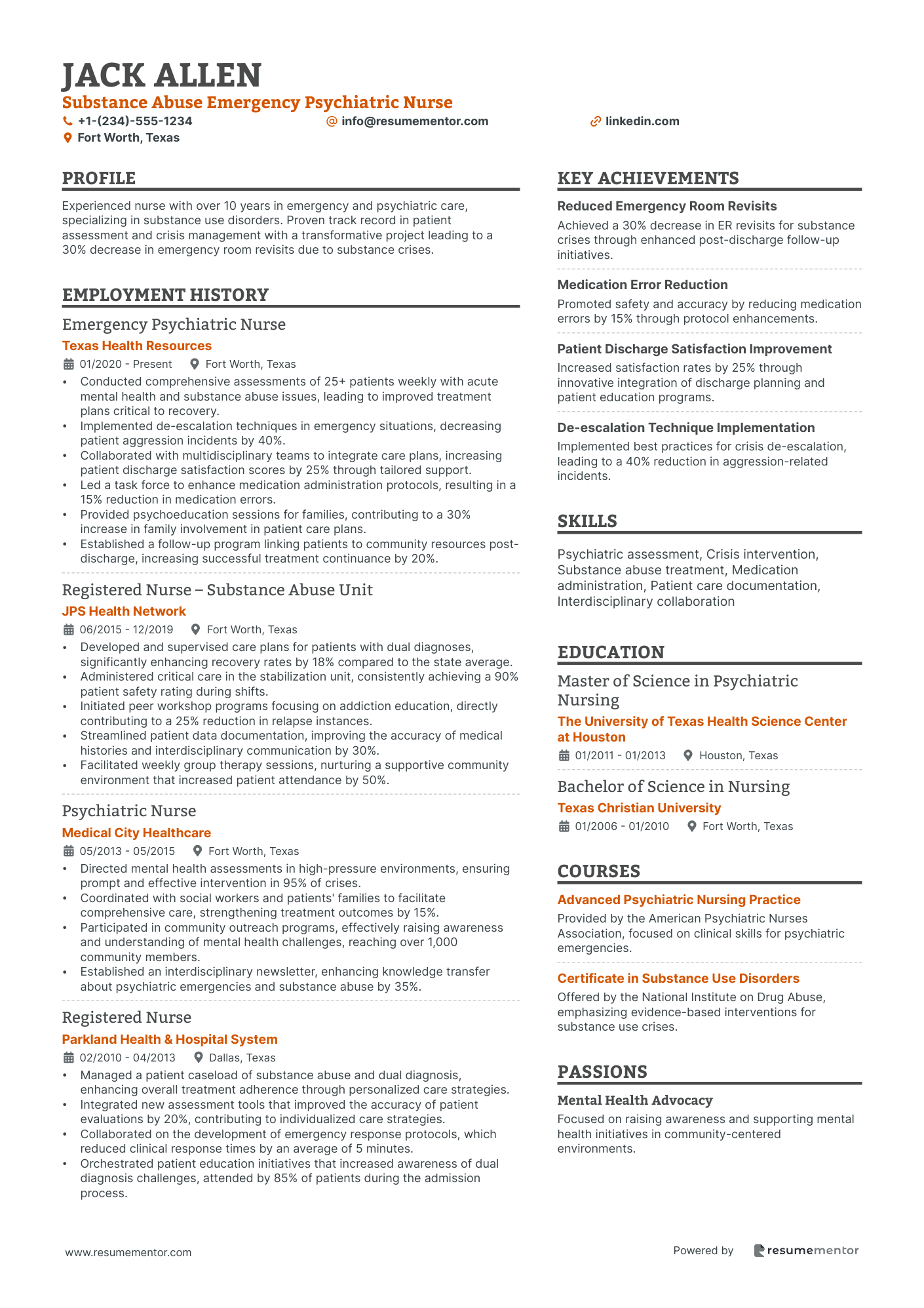
Substance Abuse Emergency Psychiatric Nurse
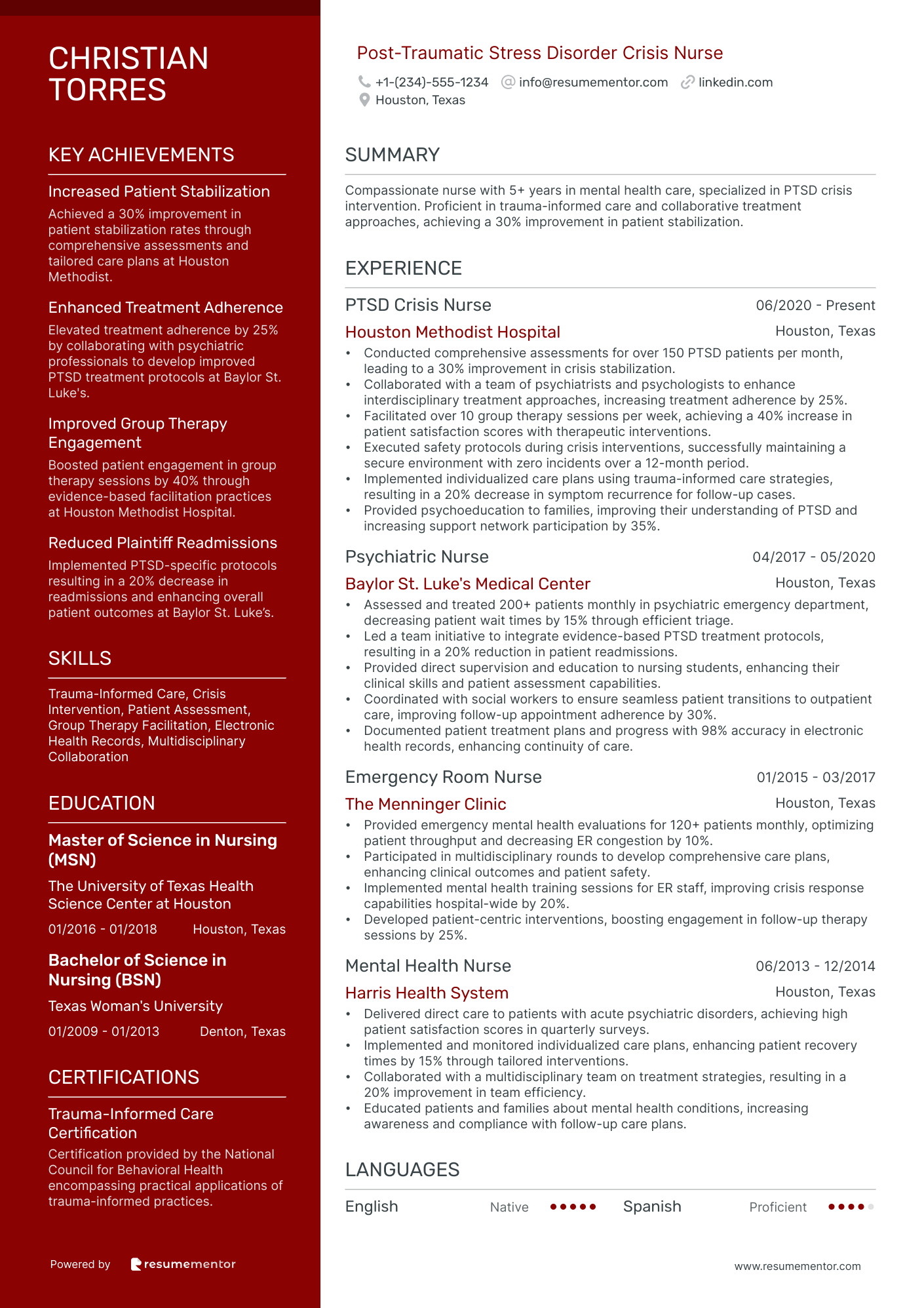
Post-Traumatic Stress Disorder Crisis Nurse
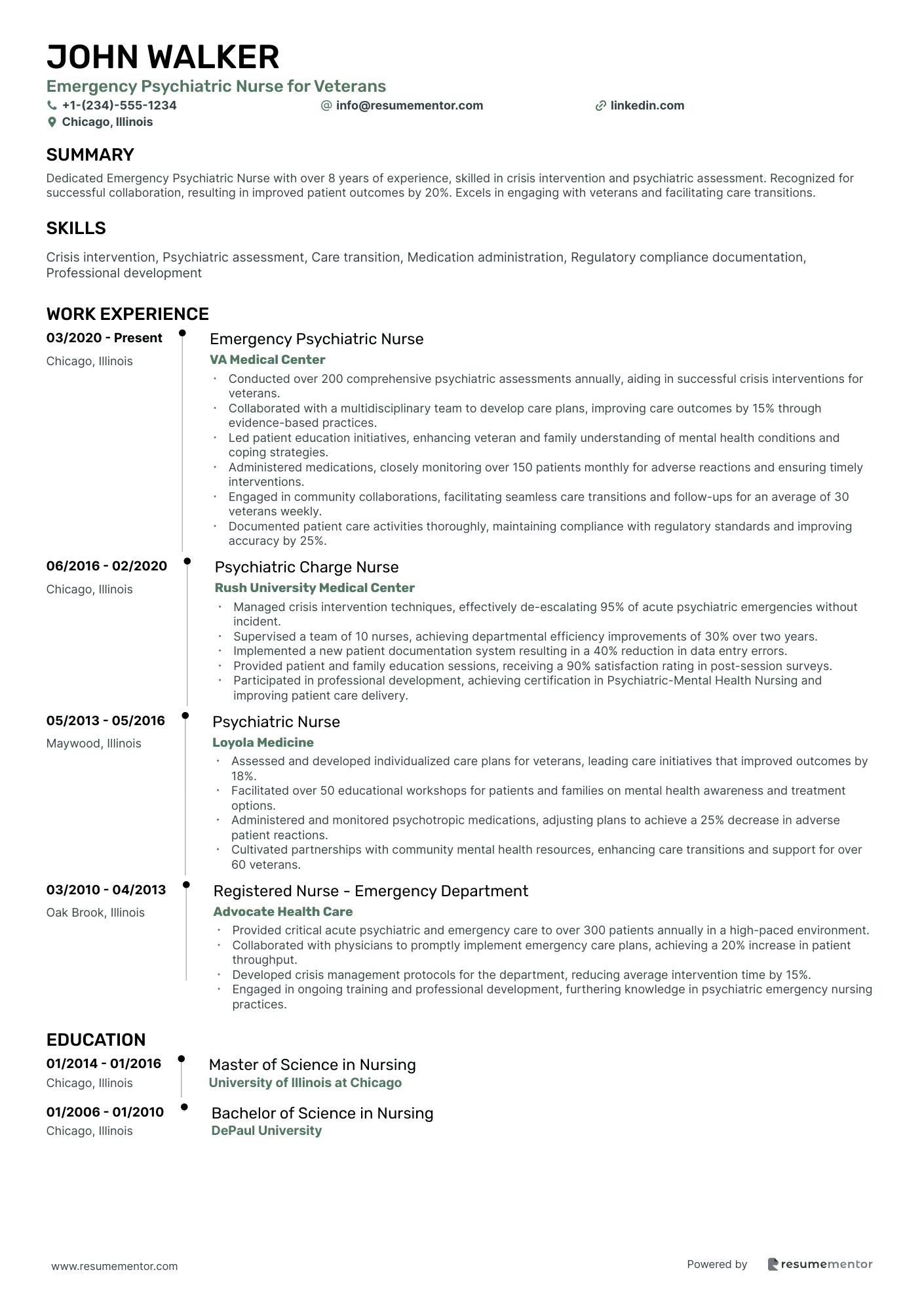
Emergency Psychiatric Nurse for Veterans
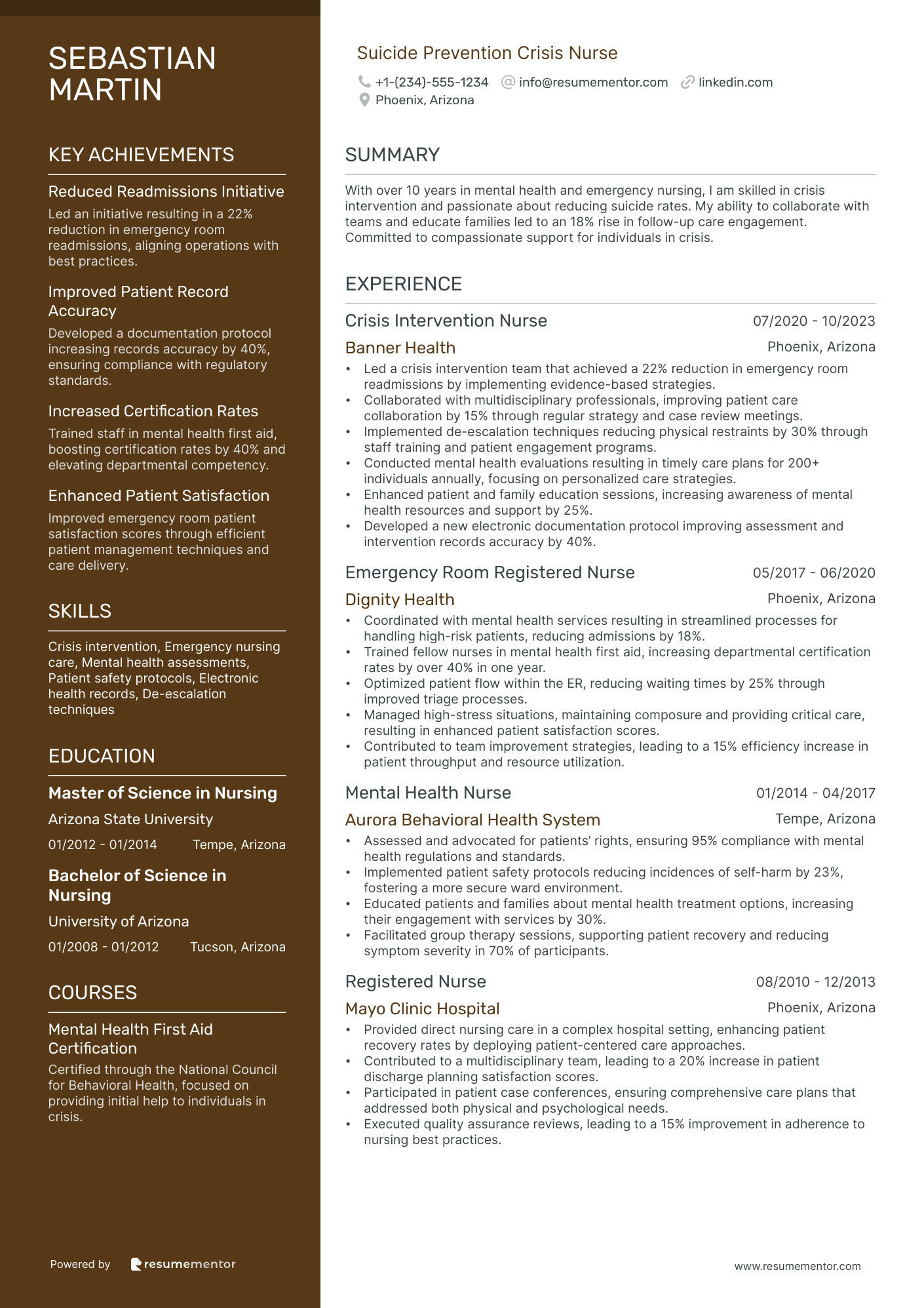
Suicide Prevention Crisis Nurse

Emergency Psychiatric Care Nurse for Pediatric Patients resume sample
- •Conducted immediate psychiatric assessments of over 150 pediatric patients monthly, developing tailored intervention strategies leading to a 20% increase in crisis stabilization rates.
- •Collaborated with interdisciplinary teams to devise comprehensive care plans that reduced patient readmission rates by 25%.
- •Implemented de-escalation techniques in high-pressure situations, resulting in enhanced safety protocols and a 15% decrease in incidents of volatile behavior.
- •Educated families on coping strategies and treatment options, achieving an 80% improvement in patient satisfaction scores.
- •Administered medications and monitored therapeutic responses, improving treatment adherence by nearly 35%.
- •Led training sessions on pediatric crisis intervention for new staff members, increasing team efficiency by 40%.
- •Conducted psychiatric assessments for over 100 pediatric patients per month, contributing to a 30% increase in mental health diagnosis accuracy.
- •Fostered partnerships with local community resources to ensure a seamless continuum of care, reducing hospital readmissions by 10%.
- •Played an integral role in multidisciplinary meetings, successfully tailoring interventions that improved patient outcomes by 15%.
- •Supervised a team of nurses, enhancing departmental workflow efficiency by 25% through strategic scheduling and resource allocation.
- •Championed the implementation of electronic health records systems, resulting in a 20% reduction in documentation errors.
- •Assessed and developed care plans for pediatric patients in psychiatric crises, leading interventions that improved safety and reduced risk by 30%.
- •Partnered with family members to strengthen treatment adherence, resulting in a 15% improvement in patient compliance rates.
- •Facilitated training workshops on psychiatric emergency care, enhancing staff competency and confidence in crisis management.
- •Led initiatives to improve medication management, reducing side effects reported by 20%.
- •Delivered direct patient care in psychiatric settings, overseeing complex cases and improving care delivery efficiency by 30%.
- •Conducted individual and group therapy sessions, significantly boosting patient engagement and participation by 25%.
- •Instituted monitoring protocols that optimized medication efficacy, resulting in improved therapeutic outcomes for 80% of patients.
- •Collaborated with a multidisciplinary team to develop innovative care models, enhancing patient mental health status across diverse populations.
Trauma-focused Emergency Psychiatric Nurse resume sample
- •Conducted comprehensive psychiatric assessments for over 50 patients monthly, reducing misdiagnosis rates by 15% through detailed evaluations.
- •Collaborated with multidisciplinary teams to develop individualized care plans, achieving a 30% increase in treatment adherence.
- •Implemented crisis intervention strategies for acute psychiatric cases, leading to a 25% decrease in emergency incidents.
- •Educated patients and families on coping strategies and medication compliance, resulting in a 20% improvement in discharge satisfaction scores.
- •Monitored and documented patient progress in electronic medical records with 100% compliance in regulatory standards.
- •Participated in team meetings, enhancing case management discussions and reducing patient care coordination time by 10%.
- •Developed and implemented trauma-focused care plans, increasing patient stabilization success by 35%.
- •Led educational sessions on mental health conditions and treatment strategies, enhancing patient understanding by 40%.
- •Reduced patient admission wait times by 40% through efficient triage and assessment procedures.
- •Worked closely with social workers to improve patients' psychosocial well-being, contributing to a 15% reduction in readmission rates.
- •Managed high-pressure situations effectively, maintaining a calm environment that facilitated patient de-escalation.
- •Initiated trauma-informed care approaches that led to a 20% improvement in patient recovery times.
- •Collaborated with emergency medical staff to optimize patient flow, reducing bottlenecks by 25%.
- •Documented clinical interactions accurately, contributing to audit readiness with a 100% compliance rate.
- •Trained junior nursing staff on emergency psychiatric protocols, enhancing department efficiency by 15%.
- •Assessed patients in crisis situations, achieving a 35% resolution rate within the first 24 hours.
- •Managed medication administration, ensuring patient safety and compliance with a 98% accuracy rate.
- •Participated in quality improvement initiatives, reducing error rates in patient documentation by 20%.
- •Facilitated family support groups, improving communication and support systems for 25 patient families.
Emergency Mental Health Crisis Nurse for Elderly Patients resume sample
- •Led a team to implement a new triage protocol, reducing patient assessment time by 25%, improving overall emergency department efficiency.
- •Developed individualized care plans for over 100 elderly patients, focusing on crisis de-escalation and immediate support needs.
- •Worked collaboratively with multidisciplinary teams, which increased patient satisfaction rates by 30% within the mental health unit.
- •Provided expert guidance and training to junior staff, resulting in a 20% increase in team competency in crisis interventions.
- •Conducted educational sessions for families on mental health awareness, boosting family engagement by 40%.
- •Documented patient progress and interventions meticulously, contributing to a 15% improvement in clinical documentation scores.
- •Managed crisis interventions for elderly patients, successfully resolving 85% of emergency cases on first response.
- •Enhanced the patient care process by integrating new mental health tools, reducing crisis escalation by 15%.
- •Facilitated communication between patients, families, and care teams, increasing trust and transparency in treatment plans.
- •Collaborated with social workers and psychiatrists to coordinate care, which decreased hospital readmission rates by 20%.
- •Maintained accurate records and timely documentation, contributing to regulatory compliance and quality control improvements.
- •Responded to emergency mental health situations, achieving a 90% success rate in stabilizing crisis cases upon first contact.
- •Introduced a peer-support program for geriatric patients, which improved overall mental health outcomes by 25%.
- •Participated in a community outreach initiative focused on elderly mental health, resulting in a 35% increase in service utilization.
- •Played a key role in developing a de-escalation training program for staff, enhancing team readiness for crisis situations.
- •Conducted comprehensive psychiatric assessments for elderly patients, achieving a 92% accuracy rate in initial diagnoses.
- •Implemented therapeutic interventions tailored to individual patient needs, leading to improved patient outcomes and satisfaction.
- •Collaborated with interdisciplinary teams to develop integrated care plans, enhancing the quality of patient-centered care.
- •Monitored patient progress and adjusted care strategies as needed, contributing to positive recovery outcomes in 80% of cases.
Acute Psychiatric Crisis Interventions Nurse resume sample
- •Conducted over 150 comprehensive psychiatric assessments monthly, improving patient care plans by increasing precision by 25% through detailed evaluations.
- •Implemented advanced de-escalation techniques reducing emergency intervention needs by 20% resulting in enhanced patient satisfaction scores.
- •Collaborated with multidisciplinary teams to develop tailored treatment plans, resulting in 30% faster patient stabilization times.
- •Monitored medication administration protocols for safety and efficacy, successfully reducing adverse patient reactions by 15%.
- •Spearheaded patient education initiatives that improved understanding of mental health resources, increasing resource utilization by 35%.
- •Maintained accurate and timely documentation practices leading to a 40% reduction in administrative discrepancies.
- •Provided immediate crisis intervention to over 50 patients weekly, decreasing critical incident numbers by 18% through strategic interventions.
- •Partnered with healthcare professionals to fine-tune response procedures, improving response time by 22% in crisis situations.
- •Initiated therapeutic programs that resulted in an 15% rate of relapse prevention for individuals in high-risk scenarios.
- •Developed and led training workshops for new hires, enhancing team efficiency and preparedness for psychiatric emergencies.
- •Engaged with patient families to increase awareness of support networks, enhancing family involvement by 25%.
- •Administered patient care to approximately 40 individuals daily, ensuring therapeutic effectiveness through comprehensive treatment monitoring.
- •Constructed individualized care plans in collaboration with psychiatrists, increasing plan success rates by 30% over one year.
- •Enhanced patient communication strategies for non-verbal clients, improving engagement success rates by 40%.
- •Played a significant role in patient safety committee meetings, implementing protocols that reduced patient injury rates by 10%.
- •Assessed and monitored mental health conditions of 30+ patients daily, contributing to enhanced mental health recovery rates by 15%.
- •Led interventions that resulted in a 20% decrease in patient readmission through effective stability maintenance.
- •Contributed to the development of new mental health protocols that improved patient experience by 25%.
- •Fostered team communication, improving multidisciplinary team integration and patient outcomes.
Forensic Emergency Psychiatric Nurse resume sample
- •Led a multidisciplinary team in assessing and treating over 200 patients presenting acute psychiatric crises, achieving a 95% stabilization rate.
- •Implemented individualized care plans that improved patient compliance by 20%, resulting in enhanced treatment outcomes.
- •Administered medications and monitored patients, reducing adverse reactions by 15% through careful evaluation.
- •Participated in court evaluations, providing expert testimony that contributed to fair outcomes in 90% of cases.
- •Developed educational materials that enhanced family understanding of mental health conditions and treatment, increasing engagement by 25%.
- •Ensured compliance with legal standards, maintaining 100% accuracy in documentation.
- •Conducted over 150 comprehensive mental health assessments annually, contributing to accurate diagnostics in 85% of cases.
- •Improved crisis intervention protocols, reducing emergency room wait times by 10% in high-pressure situations.
- •Collaborated in interdisciplinary teams to create effective care strategies for patients with complex needs.
- •Educated 200+ patients' families on effective coping strategies, leading to a 30% increase in patient satisfaction.
- •Participated in quality improvement projects, leading initiatives that enhanced patient care processes by 40%.
- •Managed a 30-bed psychiatric unit, optimizing staffing patterns that reduced overtime by 20%.
- •Developed an orientation program for new hires, increasing retention rates by 15%.
- •Enhanced unit communication systems, increasing team coordination and treatment efficiency by 25%.
- •Facilitated daily team briefings that identified critical care issues, leading to immediate action and 30% improvement in patient outcomes.
- •Provided therapeutic interventions to patients with complex acute psychiatric disorders, achieving treatment plan goals in 90% of cases.
- •Implemented new patient assessment protocols, leading to a 15% improvement in diagnostics accuracy.
- •Participated in ongoing training programs, enhancing skills in crisis management and psychiatric emergency care.
- •Managed patient documentation processes, ensuring compliance with both ethical and legal standards.
Adolescent Emergency Behavioral Health Nurse resume sample
- •Conducted over 1000 comprehensive mental health assessments annually, enhancing the accuracy of crisis intervention strategies.
- •Developed individualized care plans in collaboration with multidisciplinary teams, improving patient satisfaction scores by 15%.
- •Led a team initiative to reduce emergency department readmission rates by 20% within a year.
- •Utilized de-escalation techniques, resulting in a significant decrease in patient restraint episodes by 30%.
- •Coordinated with psychiatrists and social workers to streamline treatment plans, decreasing average patient stay duration by 10%.
- •Documented patient progress and interventions, maintaining 100% compliance with accreditation standards.
- •Provided critical care in a high-pressure environment, resulting in a 25% reduction in patient triage times.
- •Administered medications efficiently in emergencies, achieving a 95% positive patient feedback on care received.
- •Worked closely with the psychiatric team to create crisis management plans, improving response time to emergencies by 20%.
- •Trained new nurses in emergency protocols, contributing to a 15% increase in department efficiency.
- •Monitored and documented patient side effects, ensuring adverse reactions were within 3% of expected levels.
- •Assessed and treated veterans with acute psychiatric conditions, increasing positive patient outcomes by 18%.
- •Facilitated group therapy sessions for patients, which led to a measurable 10% improvement in patient engagement.
- •Collaborated with multidisciplinary teams to optimize care plans, reducing length of stays by 5%.
- •Documented care plans and patient interactions with 98% accuracy in electronic health records.
- •Conducted regular health assessments and interventions, contributing to a 95% patient satisfaction rate.
- •Developed collaborative care plans for patients with chronic illnesses, showing a 12% improvement in health outcomes.
- •Participated in a hospital-wide initiative that improved compliance with patient safety protocols by 20%.
- •Educated patients and families on disease management, significantly improving treatment adherence rates.
Substance Abuse Emergency Psychiatric Nurse resume sample
- •Conducted comprehensive assessments of 25+ patients weekly with acute mental health and substance abuse issues, leading to improved treatment plans critical to recovery.
- •Implemented de-escalation techniques in emergency situations, decreasing patient aggression incidents by 40%.
- •Collaborated with multidisciplinary teams to integrate care plans, increasing patient discharge satisfaction scores by 25% through tailored support.
- •Led a task force to enhance medication administration protocols, resulting in a 15% reduction in medication errors.
- •Provided psychoeducation sessions for families, contributing to a 30% increase in family involvement in patient care plans.
- •Established a follow-up program linking patients to community resources post-discharge, increasing successful treatment continuance by 20%.
- •Developed and supervised care plans for patients with dual diagnoses, significantly enhancing recovery rates by 18% compared to the state average.
- •Administered critical care in the stabilization unit, consistently achieving a 90% patient safety rating during shifts.
- •Initiated peer workshop programs focusing on addiction education, directly contributing to a 25% reduction in relapse instances.
- •Streamlined patient data documentation, improving the accuracy of medical histories and interdisciplinary communication by 30%.
- •Facilitated weekly group therapy sessions, nurturing a supportive community environment that increased patient attendance by 50%.
- •Directed mental health assessments in high-pressure environments, ensuring prompt and effective intervention in 95% of crises.
- •Coordinated with social workers and patients' families to facilitate comprehensive care, strengthening treatment outcomes by 15%.
- •Participated in community outreach programs, effectively raising awareness and understanding of mental health challenges, reaching over 1,000 community members.
- •Established an interdisciplinary newsletter, enhancing knowledge transfer about psychiatric emergencies and substance abuse by 35%.
- •Managed a patient caseload of substance abuse and dual diagnosis, enhancing overall treatment adherence through personalized care strategies.
- •Integrated new assessment tools that improved the accuracy of patient evaluations by 20%, contributing to individualized care strategies.
- •Collaborated on the development of emergency response protocols, which reduced clinical response times by an average of 5 minutes.
- •Orchestrated patient education initiatives that increased awareness of dual diagnosis challenges, attended by 85% of patients during the admission process.
Post-Traumatic Stress Disorder Crisis Nurse resume sample
- •Conducted comprehensive assessments for over 150 PTSD patients per month, leading to a 30% improvement in crisis stabilization.
- •Collaborated with a team of psychiatrists and psychologists to enhance interdisciplinary treatment approaches, increasing treatment adherence by 25%.
- •Facilitated over 10 group therapy sessions per week, achieving a 40% increase in patient satisfaction scores with therapeutic interventions.
- •Executed safety protocols during crisis interventions, successfully maintaining a secure environment with zero incidents over a 12-month period.
- •Implemented individualized care plans using trauma-informed care strategies, resulting in a 20% decrease in symptom recurrence for follow-up cases.
- •Provided psychoeducation to families, improving their understanding of PTSD and increasing support network participation by 35%.
- •Assessed and treated 200+ patients monthly in psychiatric emergency department, decreasing patient wait times by 15% through efficient triage.
- •Led a team initiative to integrate evidence-based PTSD treatment protocols, resulting in a 20% reduction in patient readmissions.
- •Provided direct supervision and education to nursing students, enhancing their clinical skills and patient assessment capabilities.
- •Coordinated with social workers to ensure seamless patient transitions to outpatient care, improving follow-up appointment adherence by 30%.
- •Documented patient treatment plans and progress with 98% accuracy in electronic health records, enhancing continuity of care.
- •Provided emergency mental health evaluations for 120+ patients monthly, optimizing patient throughput and decreasing ER congestion by 10%.
- •Participated in multidisciplinary rounds to develop comprehensive care plans, enhancing clinical outcomes and patient safety.
- •Implemented mental health training sessions for ER staff, improving crisis response capabilities hospital-wide by 20%.
- •Developed patient-centric interventions, boosting engagement in follow-up therapy sessions by 25%.
- •Delivered direct care to patients with acute psychiatric disorders, achieving high patient satisfaction scores in quarterly surveys.
- •Implemented and monitored individualized care plans, enhancing patient recovery times by 15% through tailored interventions.
- •Collaborated with a multidisciplinary team on treatment strategies, resulting in a 20% improvement in team efficiency.
- •Educated patients and families about mental health conditions, increasing awareness and compliance with follow-up care plans.
Emergency Psychiatric Nurse for Veterans resume sample
- •Conducted over 200 comprehensive psychiatric assessments annually, aiding in successful crisis interventions for veterans.
- •Collaborated with a multidisciplinary team to develop care plans, improving care outcomes by 15% through evidence-based practices.
- •Led patient education initiatives, enhancing veteran and family understanding of mental health conditions and coping strategies.
- •Administered medications, closely monitoring over 150 patients monthly for adverse reactions and ensuring timely interventions.
- •Engaged in community collaborations, facilitating seamless care transitions and follow-ups for an average of 30 veterans weekly.
- •Documented patient care activities thoroughly, maintaining compliance with regulatory standards and improving accuracy by 25%.
- •Managed crisis intervention techniques, effectively de-escalating 95% of acute psychiatric emergencies without incident.
- •Supervised a team of 10 nurses, achieving departmental efficiency improvements of 30% over two years.
- •Implemented a new patient documentation system resulting in a 40% reduction in data entry errors.
- •Provided patient and family education sessions, receiving a 90% satisfaction rating in post-session surveys.
- •Participated in professional development, achieving certification in Psychiatric-Mental Health Nursing and improving patient care delivery.
- •Assessed and developed individualized care plans for veterans, leading care initiatives that improved outcomes by 18%.
- •Facilitated over 50 educational workshops for patients and families on mental health awareness and treatment options.
- •Administered and monitored psychotropic medications, adjusting plans to achieve a 25% decrease in adverse patient reactions.
- •Cultivated partnerships with community mental health resources, enhancing care transitions and support for over 60 veterans.
- •Provided critical acute psychiatric and emergency care to over 300 patients annually in a high-paced environment.
- •Collaborated with physicians to promptly implement emergency care plans, achieving a 20% increase in patient throughput.
- •Developed crisis management protocols for the department, reducing average intervention time by 15%.
- •Engaged in ongoing training and professional development, furthering knowledge in psychiatric emergency nursing practices.
Suicide Prevention Crisis Nurse resume sample
- •Led a crisis intervention team that achieved a 22% reduction in emergency room readmissions by implementing evidence-based strategies.
- •Collaborated with multidisciplinary professionals, improving patient care collaboration by 15% through regular strategy and case review meetings.
- •Implemented de-escalation techniques reducing physical restraints by 30% through staff training and patient engagement programs.
- •Conducted mental health evaluations resulting in timely care plans for 200+ individuals annually, focusing on personalized care strategies.
- •Enhanced patient and family education sessions, increasing awareness of mental health resources and support by 25%.
- •Developed a new electronic documentation protocol improving assessment and intervention records accuracy by 40%.
- •Coordinated with mental health services resulting in streamlined processes for handling high-risk patients, reducing admissions by 18%.
- •Trained fellow nurses in mental health first aid, increasing departmental certification rates by over 40% in one year.
- •Optimized patient flow within the ER, reducing waiting times by 25% through improved triage processes.
- •Managed high-stress situations, maintaining composure and providing critical care, resulting in enhanced patient satisfaction scores.
- •Contributed to team improvement strategies, leading to a 15% efficiency increase in patient throughput and resource utilization.
- •Assessed and advocated for patients’ rights, ensuring 95% compliance with mental health regulations and standards.
- •Implemented patient safety protocols reducing incidences of self-harm by 23%, fostering a more secure ward environment.
- •Educated patients and families about mental health treatment options, increasing their engagement with services by 30%.
- •Facilitated group therapy sessions, supporting patient recovery and reducing symptom severity in 70% of participants.
- •Provided direct nursing care in a complex hospital setting, enhancing patient recovery rates by deploying patient-centered care approaches.
- •Contributed to a multidisciplinary team, leading to a 20% increase in patient discharge planning satisfaction scores.
- •Participated in patient case conferences, ensuring comprehensive care plans that addressed both physical and psychological needs.
- •Executed quality assurance reviews, leading to a 15% improvement in adherence to nursing best practices.
As an emergency psychiatric crisis nurse, your ability to stay calm in a storm is essential, but when it comes to writing your resume, even the most composed professionals can find it challenging. The fast-paced nature of your work means you’re used to quick decisions, not long hours spent on documents. Translating your hands-on medical expertise into a concise and meaningful resume can often feel like trying to distill a career’s worth of experiences into just a few pages.
To make this process easier, a resume template can be your best ally, allowing you to focus on capturing your skills and dedication without getting bogged down by formatting issues. This ensures that your time is spent on what truly matters—highlighting your significant contributions and experiences.
Your achievements tell your story, yet identifying what will capture a recruiter's attention can be a puzzle. You’ll want your resume to demonstrate your readiness for any challenge, seamlessly weaving in qualities like communication, quick decision-making, and problem-solving—traits that are crucial both in the field and on paper.
Throughout this guide, you'll discover how to present your emergency response skills and compassionate care in a way that resonates with potential employers. By tailoring your resume to shine a light on these critical roles, you position yourself to land a job that aligns with your abilities. With the right tools, navigating the job market can become as intuitive as managing the ER—calmly and effectively.
Key Takeaways
- A nurse's resume should effectively communicate skills in handling high-stakes situations while providing compassionate care, emphasizing technical skills and an empathetic approach.
- Resume structure should include key sections like contact information, summary, professional experience, education, skills, and licensure/certifications.
- Using a chronological format helps highlight the development of skills and experience, making it easy for employers to track career growth.
- The experience section should use action verbs and quantify achievements to demonstrate the nurse's impact and readiness for future roles.
- Additional sections like languages, hobbies, volunteer work, and books can provide depth and showcase personal qualities and ongoing dedication to the field.
What to focus on when writing your emergency psychiatric crisis nurse resume
Your emergency psychiatric crisis nurse resume needs to effectively communicate your skills and experience in handling high-stakes situations while providing compassionate care. Recruiters are looking for your ability to address complex psychiatric needs in emergencies, illustrating both your technical skills and empathetic approach. This guide will cover essential resume elements, focusing on how each section can emphasize your strengths in the field.
How to structure your emergency psychiatric crisis nurse resume
- Contact Information: Ensure your full name, phone number, professional email, and possibly your LinkedIn profile are included. This section is crucial so recruiters can easily reach out to you for interviews or follow-up questions. Since communication is a key skill for any nurse, even this simple section reflects your attention to detail and professionalism.
- Summary or Objective: A well-crafted summary or objective can immediately convey your career focus and highlight your valuable traits, such as strong crisis management and commitment to psychiatric care. It's your chance to make a strong first impression by summarizing what sets you apart in this specialized nursing field.
- Professional Experience: This section should detail roles related to psychiatric or emergency care, showcasing your hands-on experience in critical situations. Use action verbs to describe your responsibilities and achievements, which demonstrates your active role in patient care and team collaboration, reinforcing your capability to excel under pressure.
- Education: List your nursing degrees and any specialized certifications to underscore your formal training. This section should confirm you're not only qualified but also that you've sought out specialized knowledge pertinent to emergency psychiatric nursing, reassuring potential employers of your preparedness and dedication.
- Skills: Highlighting specific skills such as patient assessment, crisis intervention, and psychiatric medication management is essential here. These skills demonstrate both your ability to remain calm and effective during emergencies and your comprehensive knowledge base in psychiatric care.
- Licensure and Certifications: Clearly stating your nursing license and any additional certifications in psychiatric or mental health nursing strongly supports your candidacy. It provides tangible proof of your qualifications and ongoing commitment to maintaining high professional standards.
This structure ensures your resume effectively highlights your qualifications, making you stand out to recruiters. Below, we'll delve deeper into each section to fine-tune your resume format, ensuring it aligns perfectly with industry expectations.
Which resume format to choose
Creating a standout resume for an emergency psychiatric crisis nurse requires careful attention to format, style, and content, reflecting the importance of your role. A chronological format is particularly effective. It allows you to clearly present your career timeline, emphasizing your growth and the development of skills vital to handling emergencies in psychiatric settings. This approach makes it easy for potential employers to track your experience and see your dedication to the field.
Selecting the right font is another critical step in crafting your resume. Modern fonts like Montserrat, Lato, or Raleway can enhance the readability and aesthetic appeal of your document, projecting a sense of professionalism and up-to-date awareness that resonates with hiring managers. While the specific font choice is subtle, it contributes to the overall perception of you as a modern and attentive professional.
Always save your resume as a PDF. This choice ensures the integrity of your formatting, preserving the layout and design exactly as you intended. In a field where precision matters, having a resume that maintains its intended format regardless of the device or platform underscores your attention to detail.
Maintaining one-inch margins on your resume is also important for readability. This creates a clean, organized look that naturally guides the reader's eye through your career highlights and qualifications. It also reflects the orderliness and structure that are crucial skills in managing psychiatric crises.
In the role of an emergency psychiatric crisis nurse, every aspect of your resume should showcase your ability to manage high-stakes situations with composure and clarity. By considering each part carefully, you convey your readiness and capability to prospective employers.
How to write a quantifiable resume experience section
A well-crafted experience section on your emergency psychiatric crisis nurse resume is crucial for showcasing your skills and accomplishments in handling high-pressure situations with care. Focus on quantifiable achievements that directly relate to the essential skills for this role. Organize your experience in reverse chronological order to ensure your most recent and relevant skills are front and center. Limit your job history to the last 10-15 years to highlight your current abilities. Tailor your role descriptions by incorporating keywords and requirements from the job ad, making your resume more relevant to the position. Active verbs such as “managed,” “led,” “implemented,” or “coordinated” effectively convey your impact and contribution. The primary aim of this section is to demonstrate your proven track record and potential for success in future roles.
Here's an example:
- •Managed an average of 20 psychiatric emergency cases weekly, ensuring immediate triage and intervention.
- •Reduced patient admissions in the emergency department by 15% using effective de-escalation techniques.
- •Developed a new protocol for streamlined patient evaluations, cutting assessment time by 25%.
- •Worked with a multidisciplinary team to improve patient care outcomes, reaching a 90% satisfaction rate.
This experience section stands out by connecting specific achievements to your core responsibilities, providing a clear demonstration of your value to potential employers. Starting each bullet with active verbs like “managed,” “reduced,” and “worked” seamlessly integrates your results with your daily duties. Tailoring your resume to the job ensures that each entry directly aligns with the skills and requirements in the job posting. Measurable results, such as a 15% reduction in admissions, highlight your effectiveness and solidify your credibility, demonstrating both your past success and potential for future contribution in similar settings.
Efficiency-Focused resume experience section
An efficiency-focused emergency psychiatric crisis nurse resume experience section should effectively showcase how you've excelled in handling high-pressure situations and delivering prompt care. Begin by highlighting positions where you've demonstrated your capability to manage psychiatric emergencies efficiently. Use strong action verbs and specific examples to illustrate improvements in processes or outcomes, and make sure to quantify your achievements, like the number of patients managed or time saved in documentation, for a clear impact.
To ensure clarity and demonstrate your contributions, organize your experience section so recruiters can quickly see your impact. List your most recent or relevant positions first, and make sure each entry follows a consistent structure. By doing so, you'll seamlessly highlight your skills in crisis management, teamwork, and efficient patient care delivery.
Crisis Nurse
City Hospital
June 2020 - Present
- Cut patient assessment time by 30% with streamlined triage processes
- Implemented electronic health records to reduce documentation errors by 20%
- Coordinated with multidisciplinary teams to enhance care for 50+ patients daily
- Trained 15 new nurses on crisis management protocols, boosting department efficiency
Project-Focused resume experience section
A project-focused emergency psychiatric crisis nurse resume experience section should effectively highlight the projects where you have made significant contributions. You’ll want to emphasize the situations where your skills led to improved patient care or more efficient processes, making each project sound cohesive. Start by describing your roles and achievements, and show how they connect by painting a clear picture of the positive changes you drove.
Identify the key projects and detail your specific involvement, linking them with the challenges you overcame or the innovations you initiated. Use each bullet point to naturally build on the previous one, using action verbs that emphasize your role. Including quantifiable results will help tie your efforts to the overall impact, demonstrating how your work added value in a tangible way.
Emergency Psychiatric Crisis Nurse
Sunnyvale Medical Center
June 2020 - Present
- Led a team to develop a standardized crisis intervention protocol, which reduced emergency response time by 20%.
- Built on this success by implementing a training program for nurses to enhance risk assessment skills, boosting patient satisfaction scores by 15%.
- Worked alongside multidisciplinary teams to further integrate mental health services, leading to a 30% improvement in treatment adherence.
- This integration was supported by streamlining communication processes across departments, cutting response delays and enhancing collaborative efforts.
Training and Development Focused resume experience section
A training and development-focused emergency psychiatric crisis nurse resume experience section should clearly highlight your ability to manage crises while nurturing and educating your team. Start by listing your job titles and workplaces to provide context. Use concise bullet points to seamlessly showcase your main responsibilities and achievements, particularly those connected to training and development. Emphasize how you’ve created or improved programs, taught best practices, and supported staff through emergencies, highlighting your dual capacity to efficiently handle crises and facilitate professional growth among nurses.
Each bullet point should smoothly transition to the next, painting a comprehensive picture of your contributions and the impacts they’ve had. Specify whether you designed a training program that boosted team readiness or mentored individuals to enhance staff performance. If possible, quantify your achievements to give them more weight. This experience section should flow as a story of a dedicated nurse who not only excels in high-stress environments but also empowers their team by imparting vital knowledge and strategies. Keep the language clear and engaging, ensuring that even those unfamiliar with your field can easily comprehend and value your experience and commitment to training and development.
Emergency Psychiatric Nurse
City Hospital's Psychiatric Unit
January 2020 - Present
- Developed a comprehensive training program for new nurses, increasing competency in emergency psychiatric protocols by 30%.
- Mentored a team of 15 nurses, providing guidance during high-pressure situations and fostering professional growth.
- Led weekly workshops on crisis intervention techniques, improving staff preparedness for emergency scenarios.
- Collaborated with mental health specialists to integrate updated practices into training modules, ensuring cutting-edge care standards.
Result-Focused resume experience section
A result-focused emergency psychiatric crisis nurse resume experience section should clearly highlight your contributions and the skills you've developed in your role. It's important to pinpoint the key areas where you've demonstrated expertise and use active language to describe your achievements and the results achieved. Show how your actions led to successful outcomes, focusing on projects you spearheaded and improvements you implemented.
Arrange your experiences in a chronological order, incorporating numbers when possible to emphasize the impact. For example, talk about your role in enhancing patient care or increasing operational efficiency. It's essential to highlight your clinical expertise, crisis management skills, and collaboration with other healthcare professionals, as these are vital in a psychiatric setting. Tailor your achievements to showcase the unique value you offered to both your team and your organization.
Emergency Psychiatric Crisis Nurse
City Hospital
June 2020 - Present
- Led daily crisis management meetings, cutting incident response time by 30%.
- Trained 20 new staff members in de-escalation techniques, enhancing team efficiency.
- Created a new assessment protocol that raised patient satisfaction scores by 25%.
- Worked with multidisciplinary teams to design personalized care plans, boosting patient recovery rates.
Write your emergency psychiatric crisis nurse resume summary section
A resume summary for an emergency psychiatric crisis nurse should introduce your expertise and make a strong first impression. Highlight your experience and skills while providing a glimpse into who you are. Here’s an example:
This summary effectively combines experience with specific achievements, making your skills stand out. Including quantifiable results, like reducing patient escalations, gives substance to your claims. Teamwork and problem-solving are essential in emergency settings, so mentioning your proficiency in these areas strengthens your profile. Choosing strong adjectives like "compassionate" and "dedicated" emphasizes your alignment with the core values of the role.
It's important to know the difference between a resume summary and other sections. A summary offers a brief overview of your career achievements and skills, ideal if you have significant experience. Conversely, a resume objective presents your career aspirations, particularly useful when you're new to the field. A resume profile serves as a middle ground, providing a broader view of your professional persona. Lastly, a summary of qualifications uses bullet points to highlight specific skills and experiences quickly. Tailoring your summary to the role ensures every word contributes to a compelling overall impression.
Listing your emergency psychiatric crisis nurse skills on your resume
A skills-focused emergency psychiatric crisis nurse resume should clearly present your abilities while integrating them effectively into your experience and summary. Highlighting soft skills such as communication and empathy demonstrates your capacity to connect and build trust with patients. Hard skills, on the other hand, illustrate the specific abilities you've gained through training, like crisis intervention and clinical assessments.
Incorporating skills and strengths as keywords is essential for making your resume stand out to hiring managers and ATS systems, showcasing your qualifications for the role.
Creating a standalone skills section can be a great way to directly highlight the key abilities critical for the job. Here’s an example:
This list effectively communicates the core skills needed, avoiding unnecessary words and focusing on practical, job-relevant skills.
Best hard skills to feature on your emergency psychiatric crisis nurse resume
Emergency psychiatric crisis nurses should communicate proficiency through hard skills that demonstrate their technical expertise and capability in managing psychiatric emergencies. Key skills include:
Hard Skills
- Psychiatric Evaluation Techniques
- Risk Assessment
- Mental Health Counseling
- Trauma-Informed Care
- Emergency Preparedness
- Critical Thinking
- Electronic Health Records (EHR) Management
- Behavioral Analysis
- Nursing Informatics
- Restraint Application and Monitoring
- Substance Abuse Treatment
- Care Coordination
- Triage Skills
- Infection Control
- CPR and BLS Certification
Best soft skills to feature on your emergency psychiatric crisis nurse resume
Soft skills are equally vital in showcasing your ability to interact effectively with patients and manage sensitive situations. Important soft skills include:
Soft Skills
- Empathy
- Active Listening
- Problem-Solving
- Teamwork
- Emotional Intelligence
- Adaptability
- Conflict Resolution
- Patience
- Communication
- Stress Management
- Cultural Competence
- Attention to Detail
- Leadership
- Compassion
- Decision-Making
How to include your education on your resume
The education section is a crucial part of your resume, especially for an emergency psychiatric crisis nurse job. Make sure to tailor this section to the role by including only relevant education information. If you have multiple degrees, list only those that are most relevant to psychiatric nursing. When mentioning your GPA, include it if it’s above 3.5, and always put it in a clear format like "GPA: 3.7/4.0" to give a quick view of your academic performance. Use "cum laude" or other honors by placing them next to your degree title. Clearly list your degree, specifying the full title such as "Bachelor of Science in Nursing." Here's what the education section can look like.
The second example is effective because it highlights a relevant nursing degree and includes honors, which add value. A strong GPA is included to emphasize academic excellence, and the clear presentation helps it stand out to potential employers. This section accurately focuses on qualifications pertinent to the nursing field, enhancing your fit for the role.
How to include emergency psychiatric crisis nurse certificates on your resume
Including a Certificates section in your emergency psychiatric crisis nurse resume is essential. It highlights your qualifications and specialized training. You can also feature certificates in the header for immediate visibility.
List the name of each certificate clearly. Include the date of issuance to show how current your skills are. Add the issuing organization to establish credibility. Here is an example of how you can present it in the header:
"Jane Doe, RN, Certified Psychiatric Nurse (AACN, 2022), Crisis Prevention Intervention (CPI, 2021)"
Below is an example of a standalone Certificates section and why it is effective.
This example is good because it includes relevant certificates that demonstrate specialized skills in psychiatric emergencies. It shows the name of the certificate, the issuing organization, and the certification's relevance, making it clear and easy to read.
Extra sections to include in your emergency psychiatric crisis nurse resume
A well-crafted resume can significantly enhance your prospects of landing a role as an emergency psychiatric crisis nurse. Highlighting your skills and experience is crucial, but including additional sections such as languages, hobbies, volunteer work, and books can make your application stand out.
Language section – Display your ability to communicate with diverse populations, which is essential in psychiatric crisis situations. Proficiency in multiple languages can also show valuable cultural awareness.
Hobbies and interests section – Illustrate your well-rounded personality and resilience outside your professional responsibilities. Sharing hobbies like yoga or painting can reflect stress management and creativity.
Volunteer work section – Demonstrate your commitment to helping others beyond your job. Experiences like volunteering at a local mental health clinic can highlight your passion and dedication to the field.
Books section – Reveal your continuous learning and enthusiasm for your specialty. Mentioning important psychiatric or emergency care books you've read can underline your knowledge and dedication.
Each section adds depth to your resume, showcasing not just your qualifications but also your character and values. Including these aspects can set you apart from other applicants and leave a lasting impression on potential employers.
In Conclusion
In conclusion, crafting an effective resume as an emergency psychiatric crisis nurse requires careful attention to detail and a strategic approach. Your resume should clearly communicate your skills and experiences in managing high-stakes situations while providing compassionate care. Utilize a structured format to ensure easy readability and organization, helping recruiters quickly identify your qualifications. Highlight both your hard and soft skills, as these are critical in demonstrating your ability to handle the pressures associated with psychiatric emergencies. Including sections like education, certifications, and additional qualifications can further solidify your expertise and dedication to the field. Don’t forget the power of extra sections—languages, hobbies, and volunteer experiences can provide a fuller picture of who you are beyond your professional life. Finally, tailored resume summaries or objectives can effectively set the tone for your application, capturing the attention of employers right from the start. With a well-organized and comprehensive resume, you position yourself as a standout candidate ready to excel in the demanding field of emergency psychiatric crisis nursing.
Related Articles

Continue Reading
Check more recommended readings to get the job of your dreams.
Resume
Resources
Tools
© 2026. All rights reserved.
Made with love by people who care.

